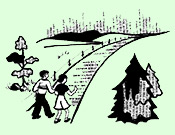
By Lois E. Wilson
The current “cancel culture” movement seems to be making its choices of whom and what to shame or destroy. It is a self-appointed judge of the suitability and value of any event, works, or words created by others whether today or years ago. Each moment we live becomes part of our history. The accumulation of experiences and those we meet along life’s way also become our past—it is all a legacy. Are we using it well?
The observation: “The past is prologue” is from Shakespeare’s “The Tempest.” The character in the play believes what has occurred in the past is the basis for the decisions to be made in the present.
The saying “what goes around comes around” is a more recent example meaning what you do or say will come back to you in the future. Negativity breeds negativity; positivity breeds positivity. The proverb originated in the United States in the 1970s. The earliest appearance in print was 1974 in an Eddie Stone book. The Golden Rule: “Do unto others as you would have them do unto you” is quoted several places in the Bible.
One of my favorite poets is Paul Laurence Dunbar. His parents had been slaves in Kentucky. His father escaped and served during the Civil War in a “colored unit” of the Union Army. They settled in Dayton, Ohio. Paul was born in 1872. His parents separated when he was a boy. It is reported that his mother taught him to read and encouraged him to pursue an education. He wrote his first verse at age six.
A few critics have tried to portray him as an apologist for the South. However, he wrote many articles about the South’s treatment of others. His “The Race Question Discussed” was a reaction to the way black soldiers who fought and risked their lives in the Spanish-American War were treated. He was a strong advocate for more education for minority children.
Some of his verse is written in the dialect of his ancestry. Many of them show with humor the similarities among cultures. His verse “In the Morning” is about a mother trying to get her son out of bed and down to breakfast. The last few lines are “Bless de food we gwine to eat—(You set still—I see yo’ feet; you jes’ try dat trick agin!) Gin us peace an’ joy. Amen!”
In today’s climate, if we were to recite this and other dialect poems of his, would we be cancel- cultured? (I now think of that 2-word phrase as a verb.) We might be accused of culture appropriation. Studying Dunbar’s works, I believe is culture appreciation. There is much to learn from those who came before us. Trying to advocate removing or ignoring our past only creates confusion and disunity. How will we know how far we have progressed as a person, culture, or nation if we don’t know where we started?
Maybe we need to heed the prayer of the mother trying to get her son up and at his chores, “Bless the food we’re going to eat… give us peace and joy. Amen!”

